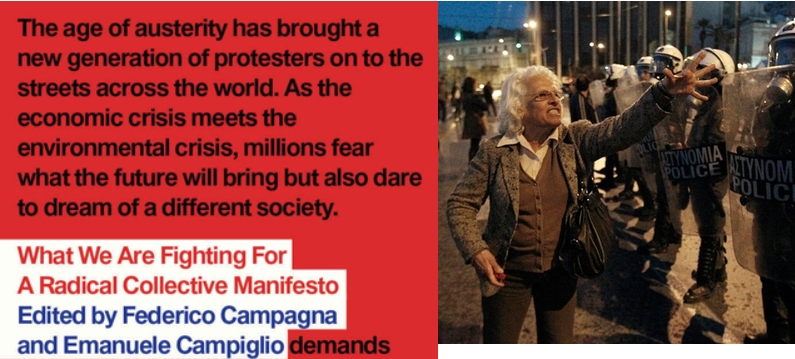
by Shaun Chamberlin | Sep 20, 2012 | All Posts, Cultural stories, Economics, Politics, Reviews and recommendations, TEQs (Tradable Energy Quotas), Transition Movement
Out today from Pluto Press is What We Are Fighting For: A Radical Collective Manifesto - a book to which I was delighted to contribute.
My chapter, "The Struggle for Meaning", wraps up the section on 'New Economics' and addresses our collective fight for meaningful lives, and the importance of the beliefs and stories that shape and power our struggle. It considers the Transition movement and TEQs through this lens, viewing them as part of the vast, diverse upwelling of people around the world resisting the current death march and fighting, so simply, for a future.
I feel most honoured to see my work published alongside inspirational writer/activists like John Holloway, David Graeber and Ann Pettifor.
Here's the publisher's description of the book:
The age of austerity has brought a new generation of protesters on to the streets across the world. As the economic crisis meets the environmental crisis, millions fear what the future will bring but also dare to dream of a different society.
What We Are Fighting For tries to answer the question that the mainstream media loves to ask the protesters. The first radical, collective manifesto of the new decade, it brings together some of the key theorists and activists from the new networked and creative social movements.
Chapters outline the alternative vision that animates the new global movement – from 'new economics' and 'new governance' to ‘new public’ and 'new social imagination'. The book concludes by exploring 'new tactics of struggle’.
--
For early reviews, see the Books page.

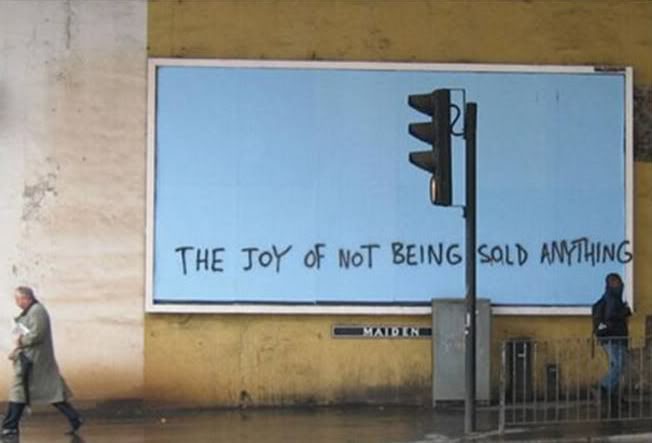
by Shaun Chamberlin | May 17, 2012 | All Posts, Cultural stories, David Fleming, Economics, Favourite posts, Politics, The Transition Timeline, Transition Movement
Last month I was one of forty or so attendees of the Transition 'Peak Money' day. It was a fascinating collection of people, from theorists to activists, and a potent opportunity to reflect on the challenges facing us all as the glaring errors at the heart of mainstream economics take their toll. This post is far more personal reflection than report, as Rob Hopkins has already done a great job on that front.
The key theme that seemed to run throughout the day, then, was 'collapse'. Sadly, I was an hour late to the event, but the first sessions I witnessed were reports from Transitioners in Portugal, Ireland and Greece on the 'front line' impacts of the economic crunch. The talk was of collapse having already happened for many families and communities there, with statistics quoted including an 89% increase in Greek unemployment in three years, and Irish suicides having doubled since 2007.
They pulled no punches. Most of us were left grey and shaken as the harsh realities of the crisis were relayed. For me, a defining memory of the day was watching the alternative economists listening to this - people who have spent decades warning of these outcomes and trying to head them off - their heads shaking sadly with lips pursed, hands involuntarily coming to their faces in dismay as their Cassandra curse unfolds. Of course, the statistics were not new to them, but hearing these stories in person somehow always brings a heavier human impact. Watching that impact reflected in their expressions felt almost inappropriate, yet doubly powerful.
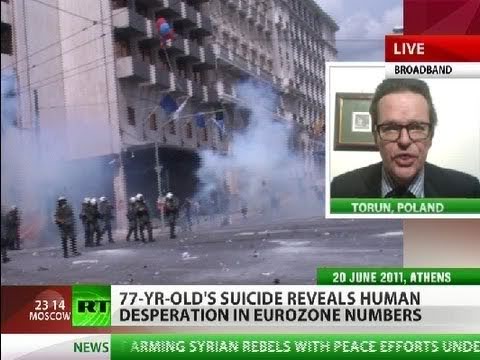 After a break, the next session was about some of the Transition projects working to address these issues, from local currencies to the new REconomy project.
The disconnect was palpable.
Could we really feel that the Transition movement's responses were adequate in the face of the suffering being inflicted by the crisis? Would speaking of local currencies feel sufficient in comforting the family of the pensioner who shot himself in front of the Greek Parliament last month after his pension was cut to nothing (described by Greeks not as suicide, but as 'financial murder')?
Over lunch I discussed this with Peter Lipman, Chair of the Transition Network. He pointed out that much the same could be asked of Transition responses to peak oil and climate change - would a local energy project, say, match up to the devastation felt by a Bangladeshi flooded out of their homeland?
Yet, on reflection, there does seem to be something different about the crisis of the financial economy - it isn't as directly rooted in physical reality. There is something immutable about the amount of fossil fuel available to the world, and overwhelming physical inertia in the inexorably increasing levels of greenhouse gases in our atmosphere.
The economic crisis, on the other hand, seems to be perhaps more wholly a crisis of narrative. It is primarily cultural inertia and entrenched sociopolitical influence that prevents us from rapidly changing the course of events, not hard physics.
After a break, the next session was about some of the Transition projects working to address these issues, from local currencies to the new REconomy project.
The disconnect was palpable.
Could we really feel that the Transition movement's responses were adequate in the face of the suffering being inflicted by the crisis? Would speaking of local currencies feel sufficient in comforting the family of the pensioner who shot himself in front of the Greek Parliament last month after his pension was cut to nothing (described by Greeks not as suicide, but as 'financial murder')?
Over lunch I discussed this with Peter Lipman, Chair of the Transition Network. He pointed out that much the same could be asked of Transition responses to peak oil and climate change - would a local energy project, say, match up to the devastation felt by a Bangladeshi flooded out of their homeland?
Yet, on reflection, there does seem to be something different about the crisis of the financial economy - it isn't as directly rooted in physical reality. There is something immutable about the amount of fossil fuel available to the world, and overwhelming physical inertia in the inexorably increasing levels of greenhouse gases in our atmosphere.
The economic crisis, on the other hand, seems to be perhaps more wholly a crisis of narrative. It is primarily cultural inertia and entrenched sociopolitical influence that prevents us from rapidly changing the course of events, not hard physics.
 This makes it a particularly exciting area for Transition to engage with, alongside the likes of Occupy, UK Uncut etc. For all the vested interests and political power around our current economic system, it seems at least theoretically possible that popular movements could actually change the fundaments of this crisis with speed.
Yet personally, when writing The Transition Timeline, economics was probably the section I found most difficult. How to even get to grips with a topic where no-one seems able to agree on even the basics - where, for example, some argue that difficult times call for belt-tightening, while others advise greater spending..?
It was the late David Fleming who helped me find bedrock, explaining that underneath all the jargon and mystery, economics is fundamentally the discussion of who should work at what and for how long, and of how society's resources should be distributed. He also noted that these are topics that we could reasonably expect most people to be interested in, and that we might thus start to wonder who framed the terms of the discussion in such a way that the majority lost interest, leaving profoundly misconceived systems in place to drain the true wealth that supports all our lives...?
The fact that, for many, discussions of economics have appeared uninteresting and confusing is probably itself an important insight - one that points to a great deception. Those who shape the flows of money, labour and resources in our society have managed to convince us that the whole topic that shapes most people's waking hours is, of all things, boring.
This makes it a particularly exciting area for Transition to engage with, alongside the likes of Occupy, UK Uncut etc. For all the vested interests and political power around our current economic system, it seems at least theoretically possible that popular movements could actually change the fundaments of this crisis with speed.
Yet personally, when writing The Transition Timeline, economics was probably the section I found most difficult. How to even get to grips with a topic where no-one seems able to agree on even the basics - where, for example, some argue that difficult times call for belt-tightening, while others advise greater spending..?
It was the late David Fleming who helped me find bedrock, explaining that underneath all the jargon and mystery, economics is fundamentally the discussion of who should work at what and for how long, and of how society's resources should be distributed. He also noted that these are topics that we could reasonably expect most people to be interested in, and that we might thus start to wonder who framed the terms of the discussion in such a way that the majority lost interest, leaving profoundly misconceived systems in place to drain the true wealth that supports all our lives...?
The fact that, for many, discussions of economics have appeared uninteresting and confusing is probably itself an important insight - one that points to a great deception. Those who shape the flows of money, labour and resources in our society have managed to convince us that the whole topic that shapes most people's waking hours is, of all things, boring.
 Which is why the accusations of parasitism and hypocrisy levelled at the Occupy movement in particular are so laughable. It is true that the Occupations only exist because of the popular support that supplies them with food, shelter etc (and even with Occupiers!). But to claim that those resources are provided from the largesse of free-market capitalism is ridiculous.
It is the dominant economic system that is the parasite, depending as it does entirely on the one economic system with a proven long-term track record of success. Not capitalism. Not communism. Nature.
People could originally build themselves a home, drink water that fell and flowed freely and source food directly for themselves, just like the other animals. Now, all the land is owned, the water is polluted and almost all sources of these essentials of life require money. Capitalism has not created the resources we require - it has co-opted them in order to sell back to us what was once truly free. If people choose to support each other in order to create a space to protest this and explore alternatives, then for the 1% to accuse them of parasitism is the height of hypocrisy.
Which is why the accusations of parasitism and hypocrisy levelled at the Occupy movement in particular are so laughable. It is true that the Occupations only exist because of the popular support that supplies them with food, shelter etc (and even with Occupiers!). But to claim that those resources are provided from the largesse of free-market capitalism is ridiculous.
It is the dominant economic system that is the parasite, depending as it does entirely on the one economic system with a proven long-term track record of success. Not capitalism. Not communism. Nature.
People could originally build themselves a home, drink water that fell and flowed freely and source food directly for themselves, just like the other animals. Now, all the land is owned, the water is polluted and almost all sources of these essentials of life require money. Capitalism has not created the resources we require - it has co-opted them in order to sell back to us what was once truly free. If people choose to support each other in order to create a space to protest this and explore alternatives, then for the 1% to accuse them of parasitism is the height of hypocrisy.
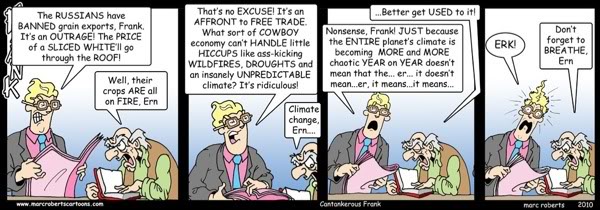 The Transition approach to money, of course, has a far less oppositional energy than Occupy, seeking to bring together all elements of society in order to address our collective crises. This can be frustrating - meaning that initiatives sometimes move only at the speed of their least radical members - but it is essential to any collective transitional approach that wishes to avoid top-down enforcement. It is a truism to note that a society can only voluntarily change as fast as it is ready to.
For me, a big part of the beauty of Transition is that it brings together two groups of people with very different motivations - those who are working to make this society more sustainable, and those who are working to build an alternative to catch people when this society collapses. There are many things that these folk disagree on, but in Transition they seem to find the ability to enthusiastically collaborate on a great diversity of projects while they chew over those thorny disagreements.
My personal perception is that the first group may be shrinking - Derrick Jensen loves to ask who believes that our society will "undergo a voluntary transition to a sustainable way of living", and claims that no-one ever raises their hand - but a gradual improvement towards sustainability is certainly still a widespread ambition.
What the Transition Money day got me pondering was whether Transition might be able to repeat the trick and team up another pair of very different viewpoints: those who are justifiably scared of collapse and its implications for themselves, their families and communities, and those who say they would welcome collapse, or even seek to hasten it, due to the damage that the current system is doing (e.g. around 50,000 species going extinct a year as we cause this planet's sixth great mass extinction).
The Transition approach to money, of course, has a far less oppositional energy than Occupy, seeking to bring together all elements of society in order to address our collective crises. This can be frustrating - meaning that initiatives sometimes move only at the speed of their least radical members - but it is essential to any collective transitional approach that wishes to avoid top-down enforcement. It is a truism to note that a society can only voluntarily change as fast as it is ready to.
For me, a big part of the beauty of Transition is that it brings together two groups of people with very different motivations - those who are working to make this society more sustainable, and those who are working to build an alternative to catch people when this society collapses. There are many things that these folk disagree on, but in Transition they seem to find the ability to enthusiastically collaborate on a great diversity of projects while they chew over those thorny disagreements.
My personal perception is that the first group may be shrinking - Derrick Jensen loves to ask who believes that our society will "undergo a voluntary transition to a sustainable way of living", and claims that no-one ever raises their hand - but a gradual improvement towards sustainability is certainly still a widespread ambition.
What the Transition Money day got me pondering was whether Transition might be able to repeat the trick and team up another pair of very different viewpoints: those who are justifiably scared of collapse and its implications for themselves, their families and communities, and those who say they would welcome collapse, or even seek to hasten it, due to the damage that the current system is doing (e.g. around 50,000 species going extinct a year as we cause this planet's sixth great mass extinction).
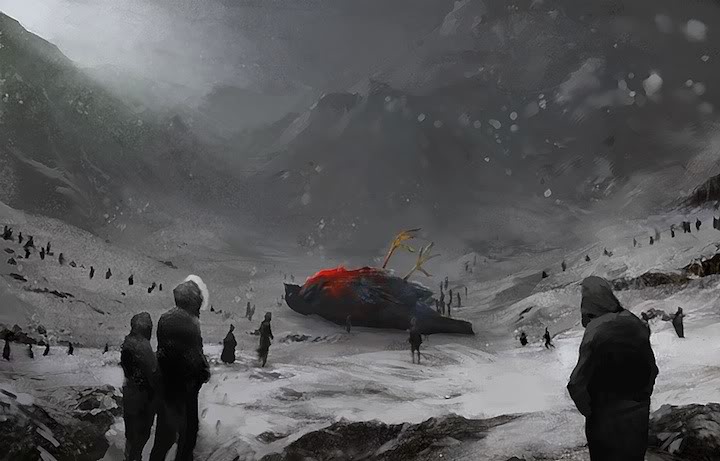
"We’ll be down to half the species of plants and animals by the end of the century if we keep at this rate" ~ E.O. Wilson
I suspect that these two perspectives can indeed work together, and the reports from Transition communities around Europe seemed to bear this out. Those who want to hasten collapse by attacking existing infrastructures seem to me to be clearly outside the Transition ethos, but there are other ways to hasten collapse. One is to work together to build alternatives. The more people flock to new alternative economies, the faster the old way loses the credibility which increasingly seems to be the only thing holding it up. As Buckminster Fuller put it, "You never change things by fighting the existing reality. To change something, build a new model that makes the existing model obsolete". In combination with means of propagating the new models, this can be a powerful principle.
So for me, the most inspiring part of the day was meeting Filipa Pimentel of Portalegre em Transição (Portugal), who reported on just that process taking place there, with the gift economy expanding rapidly in response to many people's inability to access money.
She outlined three principles developed in her local Transition initiative:
- They never turn anyone away due to lack of money (and facilitate schemes like ingredient swaps to help people support themselves in other ways).
- They never ask for (or accept) funding - they simply ask authorities and supporters to share access to their resources. They would never pay for a venue, on principle.
- Any financial resources they do come by will never be used to maintain existing models - if these can't survive without money, let them fall. Instead those resources are used to build capacity for the gift economy.
Having been tested and found useful, these principles are rapidly being taken up by other initiatives. This strikes me as an appropriate style of local response, having grown directly out of local needs and now being communicated to other communities in the nation and around the world (Filipa also now co-ordinates networking between the national Transition hubs).
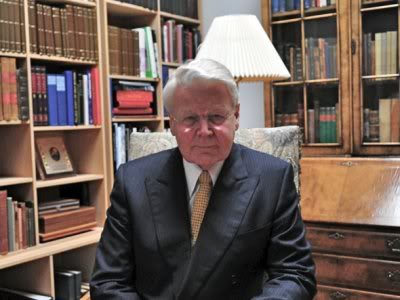 Meanwhile, another topic discussed on the day was an important and complementary shift in the political narrative, outlined in a recent interview with the President of Iceland, one of the few countries to refuse to bail out their banks. His full discussion of the reasons and dilemmas behind this decision is fascinating, but most striking was his comment that:
Meanwhile, another topic discussed on the day was an important and complementary shift in the political narrative, outlined in a recent interview with the President of Iceland, one of the few countries to refuse to bail out their banks. His full discussion of the reasons and dilemmas behind this decision is fascinating, but most striking was his comment that:
"The lesson from this is: if you want your economy to excel in the 21st century, for the IT, information-based high-tech sectors, a big banking sector, even a very successful banking system, is bad news for your economy"
It is intriguing to reflect on a culture which, faced with the classic argument of the financial sector: "We are the wealth creators, and if you tax us heavily, we will simply go elsewhere", would respond, "Ok, bye then".
When banks currently receive vastly far more in subsidies (without even considering bailouts) than they pay in tax, it surely shouldn't be such an outlandish suggestion. Hopefully the below 50 second video clip (and the comments on YouTube!) might be seen as an indicator that the tide of public opinion is turning that way..
However, while Iceland managed to hold fast to the decision of its President that:
"Europe is and should be more about democracy than about financial markets ... it was, in the end, clear that I had to choose democracy"
we here in England surely face a greater battle if we want to follow in their footsteps, with London sitting as perhaps the heart of the great global financial parasite, which has grown fat and powerful.
As Molly Scott Cato reminded us at last month's event, Britain was the origin of both the industrial revolution and the financial revolution, and the cultural stories these birthed thus probably run deeper here than anywhere else. This is likely to shape our culture's response as the worst begins to, quite literally, hit home (remember that in the UK, 94% of public service cuts and 88% of benefits cuts are reportedly yet to come).
We can see the significance of this already. Filipa reported that in Portugal people are tending to see the collapse of the financial economy as a 'return to normal' - learning to depend on each other again. Yet Phoebe Bright relayed that in Ireland the majority are refusing to countenance that this is anything more than a blip before things get back to a much younger view of 'normality' - being able to rely on money to meet our needs. The responses adopted differ accordingly.
To me, it was this clash of perspectives that was the take away message of the event. Transitioning Money must mean building both narratives and economic structures that empower people to step away from the crumbling mainstream and learn to trust in each other again, instead of in money. Portugal appears to be one place that is leading the way.


by Shaun Chamberlin | Jul 23, 2011 | All Posts, Cultural stories, Reviews and recommendations, The Transition Timeline, Transition Movement
As regular readers will know, I am an admirer of the Dark Mountain Project – fellow adventurers in uncovering and reshaping the cultural stories that define us and guide our behaviour. Their manifesto is well worth a read. So I have accepted this contribution...

by Shaun Chamberlin | Jun 9, 2010 | All Posts, Climate Change, Cultural stories, Favourite posts, Peak Oil, TEQs (Tradable Energy Quotas), The Transition Timeline, Transition Movement
https://www.darkoptimism.org/wp-content/uploads/2020/10/10-03-26-Radio-EcoShock_Chamberlin_LoFi.mp3 Christopher Fraser of London Transition has kindly transcribed the above popular interview with Canada’s Radio Ecoshock that I posted a couple of months back....

by Shaun Chamberlin | Jun 3, 2010 | All Posts, Climate Change, Cultural stories, Favourite posts, Philosophy, Reviews and recommendations
I got back from the Dark Mountain Project's Uncivilisation festival a few days ago, and while I could write about many of the aspects of that stimulating week, one thread it really tugged on for me was the role - the critical importance - of the arts in shifting the cultural stories that shape our future.
So today I would like to highlight a few musical artists who have inspired my personal journey, and to invite you to suggest a few artists of any kind who have brought something to your engagement with the global problematique, in whatever way, and perhaps deserve a little more exposure.
The 'headline act' at Uncivilisation was George Monbiot debating the usefulness of the Dark Mountain project with one of its founders. Sitting in the audience I was engaged by this - if rather frustrated by some of the arguments unvoiced or misrepresented - but then found myself profoundly refreshed to have my intellectual cogitations blown away by what followed. Immediately afterwards, Alastair McIntosh took the stage, and used the language of music to speak to the spiritual in us - to our connection with our homes, our land.
 Maria Elvorith, ‘Red wine, Lipstick and the World in my hand’, 2009
The shift in energy in the room (and in me) was palpable, as we moved from our separate intellectual camps to what felt a unified sense of wonder and shared values.
Thinking back on this, I am put in mind of some insightful advice from the late Howard Zinn which I recently discovered and am endeavouring to embed into my outlook:
"Don't look for a moment of total triumph. See it as an ongoing struggle, with victories and defeats, but in the long run the consciousness of people growing. So you need patience, persistence, and need to understand that even when you don't "win", there is fun and fulfilment in the fact that you have been involved, with other good people, in something worthwhile."
The arts are so key to that fun and fulfilment, as well as to the growth in consciousness, that I feel the need to acknowledge some of my own inspirations...
Saul Williams - Act III Scene 2 (Shakespeare)
Ani DiFranco - Self Evident
My new friend Alex Fradera has already suggested adding this link to three folk songs on the subject of the credit crisis (though clearly none as well-sung as this one).
For me personally though, Nine Inch Nails' 2007 album, Year Zero, was the point where my musical interests collided head-on with my life.
The mysterious initial trailer video (above) contained the critical clue to send online fans worldwide spiralling off into an 'Alternate Reality Game (ARG)' set in a dystopian near-future ravaged by climate destabilisation and social breakdown. Without ruining too much of the fun for newcomers who want to explore, the Viability Index site gives one flavour of the world that music fans were drawn into, some parts of which are genuinely moving and disturbing. And drawing us ever deeper was the fact that a few of the tracks off the forthcoming album lurked in its depths.
I talked with people for whom the experience - and the music it uncovered - opened their eyes to the realities of our present, as well as to new ways of engaging with those realities. And for me it led to my work on the Superstruct ARG, which tried to expand on that success.
But that's another story. For now, I'll leave you with some of the art that has affected me, and look forward to discovering more through you.
--
Nine Inch Nails - Zero-Sum
Maria Elvorith, ‘Red wine, Lipstick and the World in my hand’, 2009
The shift in energy in the room (and in me) was palpable, as we moved from our separate intellectual camps to what felt a unified sense of wonder and shared values.
Thinking back on this, I am put in mind of some insightful advice from the late Howard Zinn which I recently discovered and am endeavouring to embed into my outlook:
"Don't look for a moment of total triumph. See it as an ongoing struggle, with victories and defeats, but in the long run the consciousness of people growing. So you need patience, persistence, and need to understand that even when you don't "win", there is fun and fulfilment in the fact that you have been involved, with other good people, in something worthwhile."
The arts are so key to that fun and fulfilment, as well as to the growth in consciousness, that I feel the need to acknowledge some of my own inspirations...
Saul Williams - Act III Scene 2 (Shakespeare)
Ani DiFranco - Self Evident
My new friend Alex Fradera has already suggested adding this link to three folk songs on the subject of the credit crisis (though clearly none as well-sung as this one).
For me personally though, Nine Inch Nails' 2007 album, Year Zero, was the point where my musical interests collided head-on with my life.
The mysterious initial trailer video (above) contained the critical clue to send online fans worldwide spiralling off into an 'Alternate Reality Game (ARG)' set in a dystopian near-future ravaged by climate destabilisation and social breakdown. Without ruining too much of the fun for newcomers who want to explore, the Viability Index site gives one flavour of the world that music fans were drawn into, some parts of which are genuinely moving and disturbing. And drawing us ever deeper was the fact that a few of the tracks off the forthcoming album lurked in its depths.
I talked with people for whom the experience - and the music it uncovered - opened their eyes to the realities of our present, as well as to new ways of engaging with those realities. And for me it led to my work on the Superstruct ARG, which tried to expand on that success.
But that's another story. For now, I'll leave you with some of the art that has affected me, and look forward to discovering more through you.
--
Nine Inch Nails - Zero-Sum
 Sir Edwin Landseer, ‘Man proposes, God disposes’ 1864
Sir Edwin Landseer, ‘Man proposes, God disposes’ 1864
 Photograph by Iain D. Williams, Canada, Nov 2009
---
Edit - March 2011: This is just too good not to add to this post:
Photograph by Iain D. Williams, Canada, Nov 2009
---
Edit - March 2011: This is just too good not to add to this post:





 This makes it a particularly exciting area for Transition to engage with, alongside the likes of
This makes it a particularly exciting area for Transition to engage with, alongside the likes of  Which is why the accusations of parasitism and hypocrisy levelled at the Occupy movement in particular are so laughable. It is true that the Occupations only exist because of the popular support that supplies them with food, shelter etc (and even with Occupiers!). But
Which is why the accusations of parasitism and hypocrisy levelled at the Occupy movement in particular are so laughable. It is true that the Occupations only exist because of the popular support that supplies them with food, shelter etc (and even with Occupiers!). But 







 Sir Edwin Landseer, ‘Man proposes, God disposes’ 1864
Sir Edwin Landseer, ‘Man proposes, God disposes’ 1864
Recent Comments